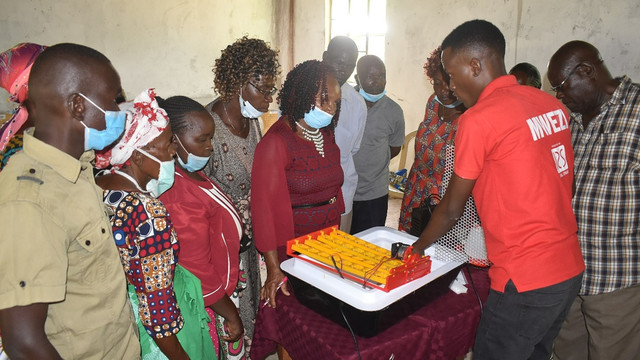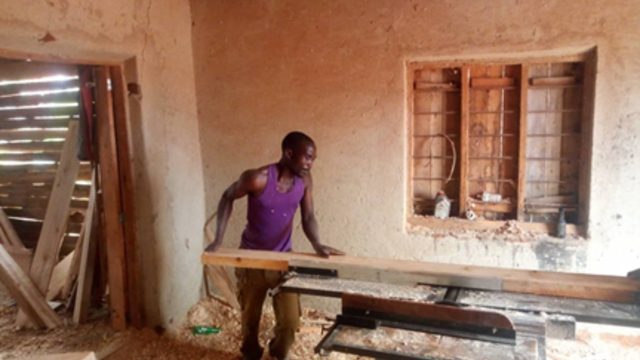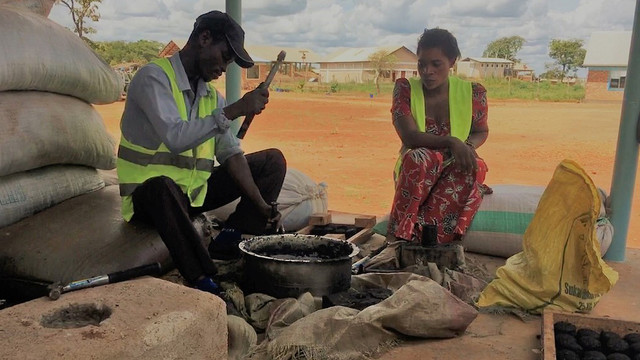Building green and inclusive energy
As part of a global advocacy programme and network promoting renewable energy access, IIED and partners built a social innovation 'Energy Change Lab' that works with pioneers in Tanzania to build an energy system that is sustainable and people-centred.

The Energy Change Lab regularly convened diverse stakeholders from both inside and outside the energy sector in Tanzania. In this group learning trip in 2018, participants learned from a mini-grid site in Chang’ombe, Tanzania, with a focus on productive uses of energy. The group included government representatives, donors, mini-grid developers, community leaders, equipment suppliers, finance and training institutes (Photo: IIED/Hivos)
The ‘Green and Inclusive Energy’ (GIE) programme is a collaboration of Hivos, ENERGIA and IIED that supports civil society advocacy in low and middle-income countries on a range of topics across Indonesia, Nepal, Kenya, Tanzania, Zimbabwe, Malawi and Guatemala, and internationally.
This is part of a strategic partnership between IIED and Hivos on ‘Dialogues and Dissent’ that includes a food programme focused on Sustainable Diets for All.
IIED is the lead research adviser for GIE, supporting Hivos country programmes to build the evidence base for advocacy and lobbying. IIED has also produced global position papers for the network and presented findings at key events such as the Sustainable Energy For All Forum and at the United Nations Framework Convention on Climate Change (UNFCCC) climate negotiations.
This has included raising awareness on inclusive finance issues for energy access through a briefing and an in-depth look at the role of subsidies. Additionally, the project produced a focus on productive uses of energy to support increased income and livelihood opportunities in rural areas, and clean cooking – bringing lessons from Malawi and Zimbabwe.
The Energy Change Lab
In 2015, IIED and Hivos – sharing a common goal to transform energy systems so these are greener and people-centred, together with a curiosity about ‘social innovation labs’ as a mechanism for change – started the Energy Change Lab in Tanzania.
Social innovation labs are an approach to tackling complex societal challenges that require systems change. Labs bring together pioneers and incumbents in a safe space to learn and reflect together, and experiment with innovations. How labs operate vary around the world, but they often use tools such as leadership programmes, scenario planning, prototyping, enterprise incubators and co-working spaces.
The lab supports pioneers and changemakers in Tanzania to create a sustainable energy system that serves all citizens. Our strategy identified three priority areas: accountability in the energy sector, job creation and improved coverage of decentralised energy solutions. Working with others, we apply four strategies: developing leaders, incubating prototypes, building evidence, and connecting people and sharing ideas.
Accountable energy: exploring feedback mechanisms
Having access to electricity does not necessarily mean access to stable quality electricity. Despite having a power supply, people can experience blackouts or brownouts (reduced availability of electricity in an area). In Tanzania, frequent disruptions in electricity make it difficult to run a business or do the daily chores at home.
We wanted to understand citizens’ experience of using energy services. In collaboration with Twaweza, the lab conducted a survey of 2,000 households to assess citizens’ perceptions.
The findings suggested that grid-connected customers were unhappy with repeated service interruptions and that people had little understanding about off-grid products, such as solar home systems – often buying cheaper, lower quality imitations of well-known brands.
The lab brought together stakeholders to discuss the findings and brainstorm pathways towards building trust between customers and energy providers.
In 2017, the Energy Change Lab piloted the Energy Supply Monitoring Initiative (ESMI), in collaboration with the World Resources Institute (WRI) and Prayas Energy Group (PEG). By placing monitoring devices in homes and small businesses across five neighbourhoods in Dar es Salaam, ESMI measured the quality of electricity supply.
The data was then aggregated and published live on a website. We were interested to understand whether providing independent data on electricity quality could help customers hold service providers accountable.
Examining the pilot in Tanzania and experiences elsewhere, we found that data can raise awareness of power problems and of the value of customer-level monitoring of power quality – particularly with the energy regulator and utility. But achieving change is difficult and takes time.
There needs to a deliberate process for using the data to influence change, and strategies need to be sensitive to the political context. In Tanzania, creating safe spaces for dialogue with industry insiders to discuss the data is more realistic than applying public or political pressure.
Decentralised energy and jobs
Catalysing productive uses of energy (PUE) often requires special design measures to overcome barriers such as gaps in local people’s business skills.
The lab started in 2015 by doing research with mini-grid developers in Tanzania to understand how they combine energy access with wider rural development processes. These included JUMEME Rural Power Supply Ltd (solar hybrid), which is highlighted in this working paper, and mini hydro projects initiated by NGOs. At the sector level, we ran many multi-stakeholder events to foster and share learning.
In 2017, we moved into an experimentation phase, working with several mini-grid operators in communities. The lab helped a mini-grid developer PowerCorner (now part of Engie) to test a prototype that helped train ‘community PUE champions’ to overcome gaps in local people’s business skills.
Our second prototype running in parallel was with mini-grid developer Rafiki Power (now part of PowerGen). The prototype sought to extend equipment supply chains to rural areas by brokering a partnership with retailers and distributors, and by preparing user manuals in Kiswahili.
We are currently working with the NGO CEFA on ways to assess business models for PUE upgrading in the Southern Highlands, in Southwestern Tanzania.
The lab has helped to raise the profile of PUE in energy debates in Tanzania, as well as built an evidence base and provided creative spaces whereby people whose organisations usually compete, come together to solve problems for the common good. Our prototypes have provided proof of concept for PUE solutions, as well as identifying pitfalls, and merit testing at scale.
Building future energy leaders
The culture in large parts of Tanzania’s energy sector and training institutions is highly technocratic, with young local entrepreneurs sometimes struggling to turn their ideas into viable business propositions. The lab has run several ‘Energy Safaris’, a five-day experiential learning programme where groups of youth work on energy issues affecting urban and rural areas.
We have collaborated with several organisations including Buni Hub, universities, NGOs and renewable energy companies.
During the safari, participants follow a facilitated process, moving from problem definition and exploration to developing ideas, prototyping, seeking and sharing feedback, and the drafting of a follow-up plan.
A core principle of the safari involves sending participants into the field, allowing people to immerse themselves in the world of the ‘end-user’, instead of relying on information from written sources or experts. In the 2019 safari, teams proposed alternatives to charcoal-fired barbecues used by meat vendors, looked at ‘greening’ Dodoma city’s master plan and explored options for promoting youth enterprises.
Participants have told us they find the practical and experiential nature of the programme highly rewarding. As well as learning about energy issues, they value the opportunity to build their problem-solving and teamworking skills, and to network with energy professionals and each other. Some safari graduates have gone on to start up their own business idea.
News and updates
Publications
Additional resources
The Energy Change Lab website
The 2019 Energy Safari, Neema Kimaro (2019), Energy Change Lab Report
Video: Lab Energy Safari 2019 summary
PUE in Tanzania, Kavita Rai, Kevin Johnstone, Fredrick Mushi (2018), Energy Change Lab Workshop Report
User manual: welding machine (2018), Hivos/IIED
User manual: juice blender (2018), Hivos/IIED
Blog: Improving Tanzania’s power quality: can data help?, by Ben Garside, Davida Wood (2018)
Making mini-grids work: productive uses of electricity in Tanzania, Arthur Contejean, Louis Verin (2017), working paper
Energy Change Lab strategy (PDF), IIED/Hivos (2017)
Blog: Encouraging dialogue and dissent, Liz Carlile (2016)
Blog: Energy literacy for all? Cracking the very hard 'soft side' of energy development, by Sarah Best (2014)
News: IIED and Hivos set up 'Change Labs' on food and energy (2014)
















